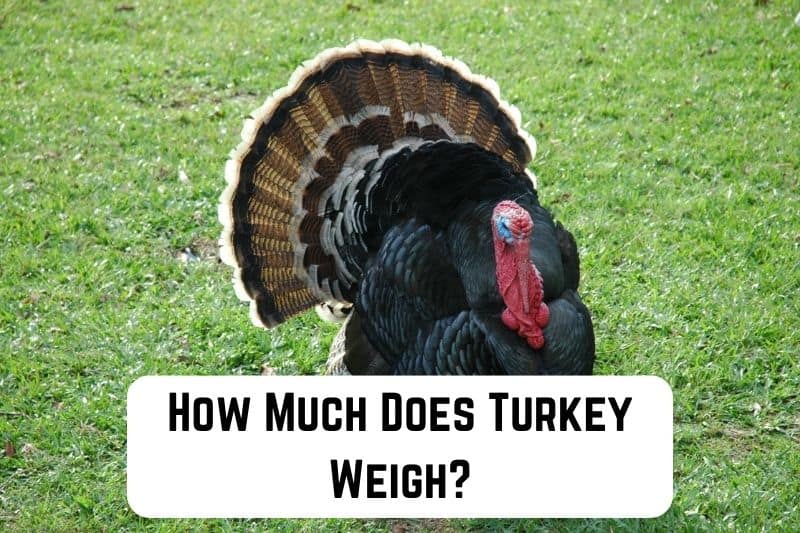When it comes to preparing a feast, knowing the weight of the turkey is crucial. This knowledge helps you cook the bird to perfection and ensure there’s enough to feed all your guests. In this article, we will explore the various weights of turkeys and how to choose the right one for your next gathering.
Understanding the different factors that influence how much turkeys weigh can be helpful for ensuring you get the perfect bird for your occasion. By the end of this article, you’ll be well-equipped with the knowledge needed to expertly select the turkey that’s just right for your table.
Read: How Much Does a Squirrel Weigh? (Complete Guide)
On average, a male turkey (also known as a tom) weighs around 16 to 30,pounds, while a female turkey (a hen) tends to be smaller, weighing between 8 to 16 pounds.
Types of Turkeys
In this section, we’ll explore three types of turkeys: commercial turkeys, wild turkeys, and heritage turkeys, examining their respective weights.
Commercial Turkeys
Commercial turkeys are the kind most commonly found in grocery stores. These birds are bred for their size and weight, especially for their breast meat, making them the ideal choice for holiday meals. Adult commercial turkeys typically weigh:
- Toms (males): 20-30 pounds (9-13 kg)
- Hens (females): 12-16 pounds (5-7 kg)
Wild Turkeys
Wild turkeys are smaller and have a more gamey flavor than their commercial counterparts. They roam freely in forests and grasslands across North America, foraging for their food. Here are the average weights of adult wild turkeys:
- Toms: 16-20 pounds (7-9 kg)
- Hens: 8-12 pounds (3-5 kg)
Heritage Turkeys
Last but not least, we have heritage turkeys. These birds are the result of years of selective breeding, preserving the natural traits and genetics of traditional turkey breeds.
Generally, heritage turkeys have a more balanced meat distribution and richer flavor than commercial turkeys. The weights of these turkeys are usually:
- Toms: 18-25 pounds (8-11 kg)
- Hens: 10-14 pounds (4-6 kg)

Understanding Turkey Weight
Average Weight of a Turkey
When selecting a turkey, it’s essential to know the average weight to ensure you choose the right size for your needs.
On average, a male turkey (also known as a tom) weighs around 16 to 30 pounds, while a female turkey (a hen) tends to be smaller, weighing between 8 to 16 pounds. Remember that these are just approximations; individual turkeys can fall outside of these ranges.
- Male Tom: 16 – 30 pounds
- Female Hen: 8 – 16 pounds
To give you some examples:
- A small hen might weigh around 8 or 9 pounds
- A medium-sized hen can weigh between 12 and 14 pounds
- A large hen could weigh up to 16 pounds
- A small tom might weigh around 16 pounds
- A medium-sized tom can weigh between 18 and 20 pounds
- A large tom could weigh as much as 24 pounds or more
Factors Influencing Turkey’s Weight
Several factors can influence a turkey’s weight:
- Age: An older turkey will typically be heavier than a younger one because it’s had more time to grow. Toms reach their maximum weight at around 5 months, while hens reach their maximum weight at about 4 months.
- Breed: There are various breeds of turkey, and some breeds are naturally larger than others. For example, the Broad Breasted White turkey is bred specifically for its larger size and higher meat yield.
- Diet and Nutrition: A turkey’s diet plays a significant role in determining its weight. Turkeys fed a healthy, balanced diet and given access to enough food will grow larger than those that receive poor nutrition.
- Living Conditions: Turkeys with plenty of space to roam and exercise generally have more muscle mass than those kept in confined spaces. Adequate living conditions also contribute to a turkey’s overall health, which can influence its weight.
- Sex: As mentioned earlier, male turkeys are usually larger than female turkeys. This is because males are naturally built to be bigger, with a larger frame and more muscle mass.
Buying a Turkey: Weight Considerations
Turkey Weight and Serving Size
When buying a turkey, you must consider the weight based on the number of guests you serve. On average, a whole turkey weighs between 10 to 16 pounds. Here’s a general guideline to help you decide:
- 10-12 lbs: Serves 6 to 8 people
- 12-15 lbs: Serves 8 to 10 people
- 15-18 lbs: Serves 10 to 12 people
- 18-22 lbs: Serves 12 to 15 people
- 22-25 lbs: Serves 15 to 20 people
Remember, these are just estimates; you should adjust according to your guests’ appetites.

Selecting the Right Weight for Your Gathering
Here are a few tips to help you select the right turkey weight for your gathering:
- Consider your guests’ preferences: While some prefer white meat, others may enjoy dark meat. Generally, smaller turkeys have a higher white meat-to-dark meat ratio. If your guests prefer white meat, select a smaller bird and supplement it with additional turkey breasts.
- Plan for leftovers: If you want to enjoy turkey sandwiches or other leftover dishes, add a couple of pounds to your estimated turkey weight.
- Take note of your oven size and roasting pan: Make sure the turkey will fit comfortably in your oven and roasting pan. You don’t want to buy a larger bird only to find out it won’t fit!
- Frozen or fresh: If you opt for a frozen turkey, allow enough time to thaw safely in the refrigerator. Thawing a turkey takes approximately 24 hours for every 5 pounds of weight.
How to Weigh a Turkey?
Weighing a turkey is a simple task that can be done with ease. Follow these steps, and you’ll have your turkey weighed quickly.
Step 1: Get a kitchen scale First, you need a kitchen scale that can handle the weight of a turkey. Make sure to choose one with a capacity of at least 20 pounds (9 kilograms) to accommodate larger birds.
Step 2: Preparation Before weighing your turkey, it is important to remove any packaging materials, including the plastic bag, netting, or twine. Afterward, be sure to thaw your turkey if frozen, as this will give you a more accurate measurement.
Step 3: Place the turkey on the scale Place a large plate or baking sheet on the scale to provide a stable surface for your turkey. Turn on the scale and ensure it is set to zero. Carefully place your turkey on the plate or baking sheet, and allow the scale to get an accurate weight reading.
Step 4: Note the weight It’s important to write down the weight of your turkey for cooking purposes. The weight will help you determine how long you need to cook your turkey and other important factors, such as the amount of seasoning needed.
Step 5: Clean up Before preparing your turkey for cooking, thoroughly clean your kitchen scale to avoid cross-contamination or foodborne illnesses. By following these simple steps, you will have successfully weighed your turkey and are now ready to proceed with your recipe.







